Kefir Benefits: 11 Science-Backed Ways It Boosts Health
Revitalize your health and well-being with this lip-smacking, probiotic drink.
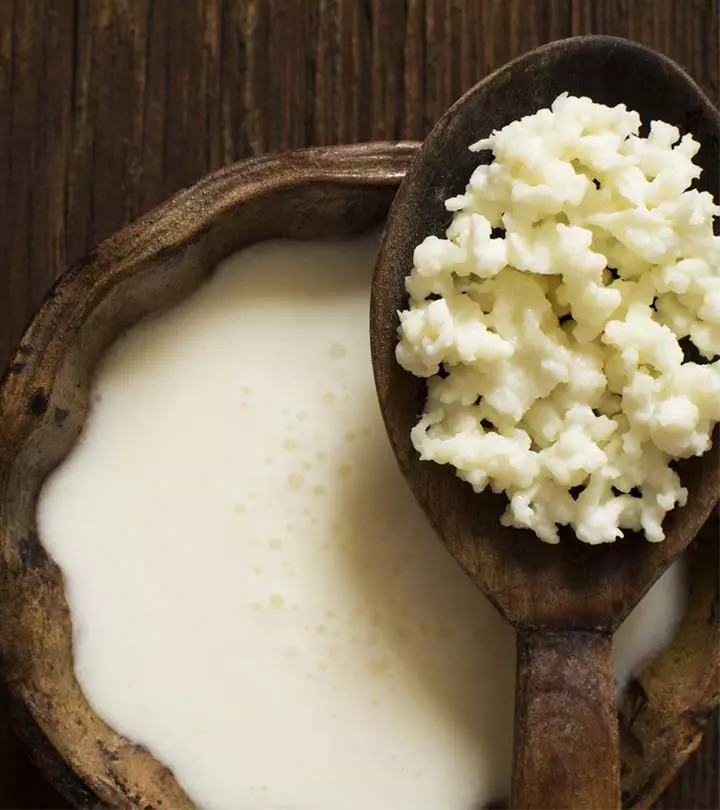
Image: iStock
Nutrition and health experts are raving about the benefits of kefir. Social media is abuzz with posts about this fermented milk drink. Wondering why? It is because kefir is an inexpensive yet nutrient-dense drink. You can also prepare it easily at home. These are just a few reasons why it is so popular. Scroll down to learn everything you need to know about kefir benefits, nutrition, risks, and more.

 Know Your Ingredient: Kefir
Know Your Ingredient: KefirWhat Is It?
A thin, white beverage made from fermented milk and kefir grains.
What Are Its Benefits?
It may boost immunity, combat inflammation, support bone health, and maintain cholesterol levels.
Who Can Consume It?
Anybody can consume it except for people with lactose intolerance and casein or whey allergy.
How Often?
You can consume 1 to 3 cups of kefir daily.
Caution
Excess consumption may cause bloating, diarrhea, gas, and bloating.
In This Article
Kefir: What Is It?
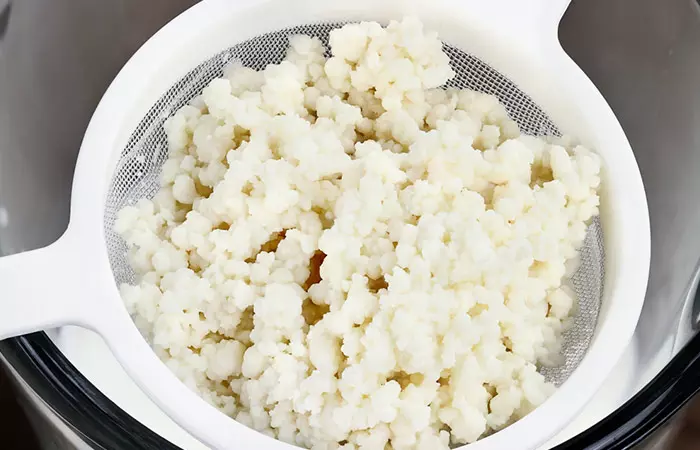
The word kefir (pronounced kee-feer) comes from the Turkish word keif, which means “feeling good”. That’s because this drink, typically made from fermenting milk with kefir grains containing a complex mix of yeasts and bacteria, has been historically drunk as a source of live probiotics. Kefir grains are not cereal grains, but instead a grainy colony of yeast and lactobacillus (the popular bacteria that turns milk into yogurt) which kind of looks like a cauliflower head (1).
As for the kefir drink, think of greek yogurt: Kefir is similarly a little sour in taste, albeit a little thinner in its consistency. The probiotic drink contains essential amino acids and is a powerhouse of vitamins and minerals. However, how nutrient-rich your kefir is, will depend on the quality of the grain and milk used as well as the fermentation process. You can prepare homemade kefir by fermenting milk from cows, goats, or sheep with kefir grains in around 24 hours (1).
 Trivia
TriviaThe wide range of claimed kefir health benefits, from improved digestion to protection against cancer, has got the modern Science community interested. Let’s see what benefits of kefir are backed by research and evidence.
Key Takeaways
- Kefir is a fermented milk beverage made with kefir grains that contain a complex mix of bacteria and yeasts.
- It is a sour version of greek yogurt with a thinner consistency. It is rich in essential vitamins, minerals, and amino acids.
- Kefir is a probiotic that boosts immunity and may support heart, gut, and bone health.
Health Benefits Of Kefir Backed By Science
When you drink kefir, what you are drinking is essentially alive with more than 300 microbial species of gut-friendly bacteria, yeasts, and fungi coexisting in a symbiotic relationship. The dependency between these bioactive components is responsible for the variety of nutrients in kefir as well as the stability of the microbiologic makeup of kefir grains and the kefir drink (1).
In simple terms, you have microbes to thank for all the amazing kefir benefits that are coming up for you in a listed form.
- Fights Against Salmonella, Escherichia coli, And Other Bad Harmful Microbes
You can ditch certain antibiotics and take up kefir. A study conducted to check the antimicrobial effects of kefir revealed that kefir can kill a wide variety of pathogens like salmonella and E.coli. The complex dynamics between the various probiotic strains and their production of antimicrobial substances may have a role to play in its effectiveness against harmful microbes (2).
- Boosts The Immune System And Promotes Immune-cell Response
You may give a big boost to your immune system by drinking kefir. According to a longevity dietitian Ella Davar RD, “Up to 60-80% of our immune system is in our gut and is known as the Gut-Associated Lymphoid Tissue (a.k.a. GALT) that consists of T and B lymphocytes, macrophages, eosinophilsi Disease- and infection-fighting white blood cells that support the immune system in humans. , mast cells and neutrophilsi White blood cells that protect the body from pathogens by healing the damaged tissues and the infection. , natural killer cells.”
Animal studies that were conducted to understand the role of bioactive peptides and kefiran (an exopolysaccharidei A carbohydrate molecule produced by fungi and bacteria that possesses antitumor and other immunostimulating properties. in kefir) in modulating immune response have shown positive results. In mice, these have stimulated the existing immune system to promote their cell response against tumors or invasive pathogens (3).
- Reduces Inflammation

Whether you choose to have kefir made from milk or kefir water, you may help your body fight against inflammation. Components in kefir aid in improving gut microbiome and therefore in suppressing pro-inflammatory cytokinesi A class of proteins secreted by cells of the immune system as well as the non-immune system cells that aid cell-to-cell communication. and enhancing the growth of anti-inflammatory cytokines. An animal study conducted to appraise the role of kefir against inflammation revealed that symbiotic cultures of kefir contain prebiotics with anti-inflammatory properties (4).
- Strengthens Bones And Reduces Risk Of Osteoporosis
Osteoporosis is one of the most dreaded conditions that pose a threat to post-menopausal women. The good news for you is that you may lower that risk by drinking kefir. A study conducted to assess the effect of kefir on gut microflora and the prevention of estrogen deficiency-related osteoporosis showed that kefir can prevent osteoporosis in mice and change the gut flora significantly. It also pointed towards stronger bones with improved bone mineral density and bone volume (5).
- Improves Gut Health And Helps In Digestion
A happy gut makes a happy you, and a fizzy glass of kefir makes a happy gut! Can you spot the link? “Our mood and the way we feel depends on our gut health”, as stated by Ella Davar RDc, “due to the fact 95% of serotonin is produced in the gut.” “Serotonin is the happy hormone responsible for our sense of wellbeing and happiness” she adds, “This is the main reason patients with depression who have inadequate levels of serotonin often have gastrointestinal manifestations, and why IBS and GI issues are strongly associated with stress, anxiety, and depression”. several studies have shown that kefir works wonders to modify the gut flora by increasing friendly microbes like bifidobacterium and lactobacillus. At the same time, it decreases the number of unfriendly microbes and reduces instances of intestinal infections. That’s not all. Kefir can also promote positive changes in activities and gene expressions of certain gut microbes (6).
When you drink kefir, you are also making it easy for your body to digest food and pass it. That is why kefir is also used commonly to relieve constipation and can be of crucial help to bedridden patients for passing food smoothly through their colon (7).
- Helps To Control Cholesterol and Supports Heart Health

Kefir is good for your gut and bowels, but did you know that it may be great for your heart too? That’s because kefir has properties to help lower your body’s cholesterol levels. The best part? It leaves the good cholesterol (high-density lipoprotein or HDL) behind and only works to reduce the total amount of cholesterol, triglycerides, and low-density lipoprotein or LDL, the bad cholesterol, as a study shows (8).
Cholesterols are important for the healthy growth of cells in the body but too high levels of cholesterol can be a dangerous thing. LDL cholesterol is called bad because it can result in fat deposits in blood vessels which put a lot of pressure on the heart and make blood flow through the arteries really difficult. All this increases the risk of heart diseases, a risk that thankfully kefir may be able to thwart (9).
- May Protect Against Cancer
You may have one more excellent reason to dabble in kefir making and putting it high on your list of favorite beverages. Research shows that kefir may have anti-carcinogenic properties which can prevent and suppress the growth of a variety of tumors in the early stages. A study conducted on mice with induced tumors to verify the effectiveness of kefir revealed that both milk kefir and soy milk kefir inhibited the tumor growth by sixty-four to seventy percent (10).
Multiple other studies have revealed that kefir has a huge potential for the prevention and treatment of cancer due to its effect on the immune system, potential to prevent mutations in cells when exposed to carcinogens, and ability to induce apoptosis (controlled cell death) of various types of cancer cells (6).
- Promotes Wound Healing
Kefir is a drink, but that does not stop it from having topical effects on wounds. A study conducted with gels made from kefir and kefir grains to treat severe infected burns showed the effectiveness of kefir as an excellent wound healer, even when compared to standard medication (10). So how does it work? Well, it is theorized that kefir’s ability to modulate the immune system enables it to assign immune cells to help with the wound healing process. The antimicrobial and antibiotic effects of kefir may also play a role in keeping the wound clean and free of infection.
- May Improve Allergy And Asthma Symptoms

You may want to drink kefir regularly if food allergies have a thing for you because the bio-active compounds of kefir can improve gut micro-flora to help your body absorb nutrients and naturally protect it from the harmful pathogens. A study to understand the effects of kefir on food allergies noted that it is a promising food to prevent food allergies and reduce the risk of stomach infections (11).
The anti-inflammatory effects of kefir can also come in handy if you are prone to air-borne allergies or asthma attacks. Though sufficient human trials have not yet been conducted, an animal study shows that kefir can significantly reduce excessive mucus generation and inflammation in asthma caused by allergic reactions (12).
- May Support Weight Loss
Drink up that kefir if you want to fight obesity and excess fat and toxin accumulation in your body. A study conducted to gather evidence on the action of kefir against fat storage and fat cell profiles in mice found that kefir reduced fat gain and deposits in liver and fat tissues. At a certain dose, kefir powder was able to completely prevent obesity in mice. It also found that kefir acts against triglycerides and LDLs, resulting in an improved lipid(fat) profile (13). Moreover, including more probiotics for weight loss, like kefir, is a good idea as it might help support your weight management journey.
A similar study conducted on humans did not show such promising results. However, there is not enough evidence to rule out kefir for weight loss yet.
- Helps Promote Skin Health
Kefir contains probiotics that can help maintain a balanced gut environment. Healthy gut microbiota is often associated with better skin health and appearance (14). Its probiotics also possess anti-inflammatory and anti-microbial properties (15). These may help soothe skin redness and swelling. Research also has shown that individuals including kefir in their diet may find relief from skin conditions like eczema (16).
Further, kefir’s richness in essential nutrients like vitamin D and calcium may help promote overall skin health and appearance (17). However, there is only limited scientific research that directly supports this, and more research is warranted in this regard.
 Trivia
TriviaNow that you are familiar with all the health benefits of kefir, let’s explore how to prepare it in the next section.
Preparation Guide Of Kefir
What You Need
- 1-2 tablespoons kefir grains
- 2 cups milk
- Glass jar
- Fine mesh strainer
- Cloth or coffee filter
Process
- Add 1–2 tablespoons of kefir grains to 2 cups of milk in the glass jar.
- Secure the jar with a rubber band or lid after covering it with a cloth or coffee filter.
- Allow the jar to settle for approximately twenty-four hours at room temperature (68–72°F).
- After 24 hours, the milk should have thickened and taken on a tangy taste. For a more intense taste, let it ferment for an additional 12 to 24 hours.
- Strain the mixture through a fine mesh strainer to extract the kefir grains from the liquid. The strained liquid is your kefir.
If you do not wish to prepare it at home, there are various kefir products on the market. The next section will take you through some of these.
Types Of Kefir Products
The different kinds of kefir products that you can find on the market include:
- Traditional Kefir: It is made from dairy and is unsweetened and tangy.
- Flavored Kefir: It contains fruits, vanilla, and other ingredients to enhance its flavor. While delicious, it may contain added sugars.
- Non-Dairy Kefir: It is made using plant-based milks, like coconut and almond. It is ideal for those who avoid dairy or are lactose intolerant.
Whether you make your own kefir at home or buy it from stores, there are many ways you can include this ingredient in your daily diet. Scroll down to the next section to learn more.
Tips To Add Kefir To Your Daily Diet
Here are some simple ways to add kefir benefits to your daily diet:
- Enjoy it as a refreshing drink with a sprinkle of your favorite herbs and spices.
- Blend it with your breakfast smoothies.
- Add it to your overnight oats or cereal.
- Use it as a base for creamy salad dressings or dips.
- Substitute kefir for buttermilk in pancakes, waffles, or muffins.
- Stir it into soups or stews for added creaminess.
- Pour it over fresh fruit for an easy and healthy dessert.
- Freeze it with fruit to make popsicles.
Now that you know how to prepare kefir at home and add it to your daily diet, let’s examine its impressive nutritional profile in the following section.
Nutritional Profile Of Kefir
According to the U.S. Department of Agriculture, 100g of low-fat, plain kefir contains (18):
- Calories: 43 kcal
- Protein: 3.79 g
- Fat: 1.02 g
- Carbs: 4.77 g
- Fiber: 0 g
- Total sugars: 4.61 g
- Lactose: 3.7 g
- Calcium: 130 mg
- Iron: 0.04 mg
- Magnesium: 12 mg
- Potassium: 164 mg
- Phosphorous: 105 mg
This is the nutritional profile of kefir. Why not look at a quick analysis to figure out if kefir is right for you?
Analyzing Kefir: Advantages Vs Disadvantages
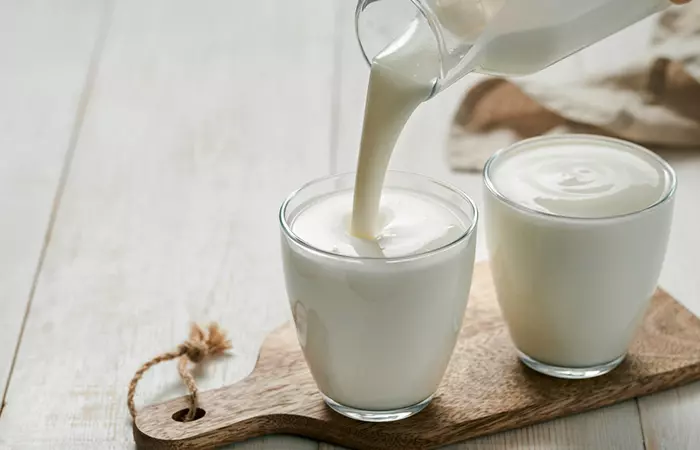
There are so many kefir health benefits that you can enjoy as you sip on this tangy and fizzy drink. It makes sense though to check out the pros and cons of including kefir in your diet.
Advantages Of Kefir
Kefir Is A Powerhouse Of Nutrients
Kefir is not only rich in active microorganisms but also can be a powerhouse of other essential nutrients (18).
- Vitamin A, K, B5, B2, and B1 are present in kefir along with carotenes.
- Minerals like calcium, magnesium, and phosphorus are plentiful in kefir. You can also find small amounts of micronutrients like copper, zinc, cobalt, manganese, and molybdenum in the drink.
- Rich source of milk protein such as casein and whey, and therefore the essential amino acids found in kefir are valine, isoleucine, tryptophan, lysine, methionine, threonine, and phenylalanine. Tryptophan is crucial to the health of your nervous system.
Kefir Is A Powerful Probiotic
Kefir contains around 300 species of bacteria, yeast, and fungi working symbiotically. That makes kefir a very strong probiotic; stronger than yogurt, you may argue (1).
Kefir Is Low In Lactose
The answer to your question, does kefir have lactose, is yes. But luckily, you can drink kefir even if you are lactose intolerant. That’s because it loses lactose (natural sugars in milk) during the fermentation process and contains very low amounts of it by the time it is ready for you to drink (19).
Disadvantages Of Kefir
- You Cannot Drink Milk Based Kefir If You Are Allergic To Milk
You can drink kefir with lactose intolerance but not with an allergy or intolerance to milk proteins such as whey or casein. However, you can enjoy the kefir health benefits by drinking coconut or soy milk-based kefir or kefir water.
- Kefir Is Not Sugar-free
Kefir is made from fermenting milk, which contains naturally occurring sugar. The fermentation process does not remove all the sugars in it. So, if you are on a keto diet, you may want to check the labels carefully, especially when it comes to store bought kefir with added flavors (which often means “added sugar”).
- Store-bought flavored Kefir Is High In Sugar
It is best to stick to plain kefir, even if you are buying from a health or grocery store as the flavored variants can be packed with sugar.
- Homemade Kefir May Contain A Bit Of Alcohol
No, the alcohol in homemade kefir won’t get you even close to tipsy as there may only be trace amounts of alcohol in there. If you want to steer clear of any possibility of alcohol in your kefir, you can opt for commercially prepared versions.
Dr. Mehmet Yildiz, a blogger, shares his personal journey of reintroducing three foods (egg yolks, whipped cream, and kefir) to his diet. He initially eliminated these foods due to digestive discomfort but started eating kefir in small amounts before main meals and described his experience as follows: “It does not raise my blood sugar and does not take me out of ketosis (i).”
Infographic: 4 Reasons To Drink Kefir Regularly
Kefir, a fermented milk drink with a tart taste and creamy texture, has gained popularity in recent years for its numerous health benefits. It is packed with beneficial bacteria and yeast strains and is a nutritional powerhouse that can promote overall well-being. Check out the infographic below to learn why you must include kefir in your diet.
Some thing wrong with infographic shortcode. please verify shortcode syntaxKefir is a delicious Turkish fermented milk beverage replete with nutrients. It is loaded with essential amino acids, vitamins, and minerals that support good health. The benefits of kefir range from better immunity to reduced inflammation. It also may help promote heart, gut, and bone health. In addition, kefir benefits also come from its natural antimicrobial properties. It may also boost wound healing. However, excess intake may cause problems. Kefir can also trigger allergies due to the presence of milk proteins. Hence, limit its use and consult a doctor if you experience any adverse reactions.
Frequently Asked Questions
Which is better, kombucha or kefir?
Both kombucha and kefir are types of fermented foods and drinks. These probiotic beverages have comparable nutrient profiles and health benefits. However, kombucha is more suitable for those with lactose intolerance as it has a tea base as opposed to kefir which has a milk base. Alternatively, kombucha may be better for those looking for weight loss benefits as it is lower in calories and sugar content as compared to kefir. There are several additional points of distinction between the two and depending on your preferences and requirements one may be better suited to you than the other.
Is kefir good for your liver?
Yes, kefir may be beneficial for the liver. In an animal study, kefir was shown to improve the symptoms of non-alcoholic fatty liver syndrome due to its anti-inflammatory effects on the body (20).
Is kefir better than probiotic pills?
Yes, probiotic foods such as kefir are better than probiotic pills as the body may be able to access the probiotics from such foods more readily than from the pills. The probiotics in pills may be destroyed by stomach acids before they are utilized. In addition, kefir contains a wide variety of probiotics and bioactive compounds, which makes it better than probiotic pills which may contain a limited variety of strains.
Is kefir good for joints?
Kefir has anti-inflammatory effects on the body, which may help in maintaining bone and joint health. Animal studies suggest that it may help improve symptoms of rheumatoid arthritis (21).
Is kefir good for kidneys?
Kefir may be good for kidneys and exert a protective effect on them by regulating blood glucose levels and reducing levels of creatinine and urea and lowering oxidative stress (22).
Illustration: Kefir Benefits & Advantages And Disadvantages To Be Aware Of

Image: Dall·E/StyleCraze Design Team
Should you start your day with a delicious and nutritious kefir smoothie? Take a look at this video for a tasty recipe and find out when best to drink it.
Personal Experience: Source
StyleCraze's articles are interwoven with authentic personal narratives that provide depth and resonance to our content. Below are the sources of the personal accounts referenced in this article.
i. Here’s why and how I started eating cream, eggs, and kefir againhttps://dr-mehmet-yildiz.medium.com/heres-why-and-how-i-re-introduced-3-nutritious-and-delicious-foods-to-my-customized-diet-9c3016d9ffbc
References
Articles on StyleCraze are backed by verified information from peer-reviewed and academic research papers, reputed organizations, research institutions, and medical associations to ensure accuracy and relevance. Read our editorial policy to learn more.
- Milk Kefir: Nutritional Microbiological and Health Benefits
https://www.cambridge.org/core/journals/nutrition-research-reviews/article/milk-kefir-nutritional-microbiological-and-health-benefits/1393DC2B8E5F08B0BE7BD58F030D387B - In Vitro Assay of the Antimicrobial Activity of Kephir against Bacterial and Fungal Strains
https://pubmed.ncbi.nlm.nih.gov/21624484/ - Immunomodulating Capacity of Kefir
https://pubmed.ncbi.nlm.nih.gov/15909685/ - Anti-inflammatory Properties of Kefir and Its Polysaccharide Extract
https://www.researchgate.net/publication/7488350_Anti-inflammatory_properties_of_kefir_and_its_polysaccharide_extract - Kefir Peptides Prevent Estrogen Deficiency-Induced Bone Loss and Modulate the Structure of the Gut Microbiota in Ovariectomized Mice
https://pubmed.ncbi.nlm.nih.gov/33182364/ - The Microbiota and Health Promoting Characteristics of the Fermented Beverage Kefir
https://www.ncbi.nlm.nih.gov/pmc/articles/PMC4854945/ - Fermented Milk Kefir: Probiotic Content and Potential Health Benefits
https://www.researchgate.net/publication/325689271_Fermented_milk_kefir_probiotic_content_and_potential_health_benefits - Hypocholesterolaemic Effects of Milk-Kefir and Soyamilk-Kefir in Cholesterol-Fed Hamsters
https://pubmed.ncbi.nlm.nih.gov/16611384/ - Cholesterol: The Good the Bad and the Ugly – Therapeutic Targets for the Treatment of Dyslipidemia
https://www.ncbi.nlm.nih.gov/pmc/articles/PMC5586853/ - Evaluation of Wound Healing Activities of Kefir Products
https://www.sciencedirect.com/science/article/abs/pii/S0305417911003536?via%3Dihub - Antitumor Activity of Milk Kefir and Soy Milk Kefir in Tumor-bearing Mice
https://pubmed.ncbi.nlm.nih.gov/12734066/ - The Anti-Allergenic Properties of Milk Kefir and Soymilk Kefir and Their Beneficial Effects on the Intestinal Microflora
https://onlinelibrary.wiley.com/doi/abs/10.1002/jsfa.2649 - Anti-Inflammatory and Anti-allergic Effects of Kefir in a Mouse Asthma Model
https://pubmed.ncbi.nlm.nih.gov/17869642/ - Kefir and the Gut–Skin Axis
https://www.ncbi.nlm.nih.gov/pmc/articles/PMC9653948/# - The Effects of Kefir and Kefir Components on Immune and Metabolic Physiology in Pre-Clinical Studies: A Narrative Review
https://www.ncbi.nlm.nih.gov/pmc/articles/PMC9450431/# - Homemade Kefir Consumption Improves Skin Condition—A Study Conducted in Healthy and Atopic Volunteers
https://www.ncbi.nlm.nih.gov/pmc/articles/PMC8622502/ - Vitamin D and the skin: Focus on a complex relationship: A review
https://www.ncbi.nlm.nih.gov/pmc/articles/PMC4642156/ - Kefir, lowfat, plain, LIFEWAY
https://fdc.nal.usda.gov/food-details/170904/nutrients - Kefir Prevented Excess Fat Accumulation in Diet-induced Obese Mice
https://pubmed.ncbi.nlm.nih.gov/28110622/ - A Review: Chemical Microbiological and Nutritional Characteristics of Kefir
https://www.tandfonline.com/doi/full/10.1080/19476337.2014.981588 - Kefir peptides prevent high-fructose corn syrup-induced non-alcoholic fatty liver disease in a murine model by modulation of inflammation and the JAK2 signaling pathway
https://idp.nature.com/authorize?response_type=cookie&client_id=grover&redirect_uri=https%3A%2F%2Fwww.nature.com%2Farticles%2Fnutd201649 - Anti-Inflammatory effect and bone protection of kefir peptides in a rat model of adjuvant-induced rheumatoid arthritis
https://faseb.onlinelibrary.wiley.com/doi/abs/10.1096/fasebj.2019.33.1_supplement.lb133 - The Effects of Kefir on Kidney Tissues and Functions in Diabetic Rats
https://link.springer.com/article/10.1007/s12602-020-09698-9
Read full bio of Ella Davar
Read full bio of Varsha Patnaik
Read full bio of Ravi Teja Tadimalla
Read full bio of Payal Karnik





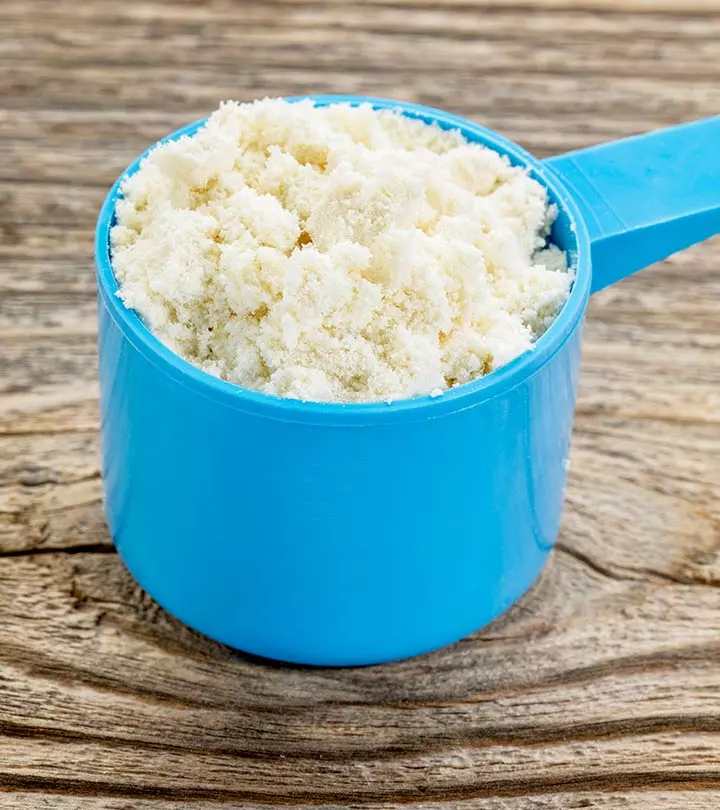
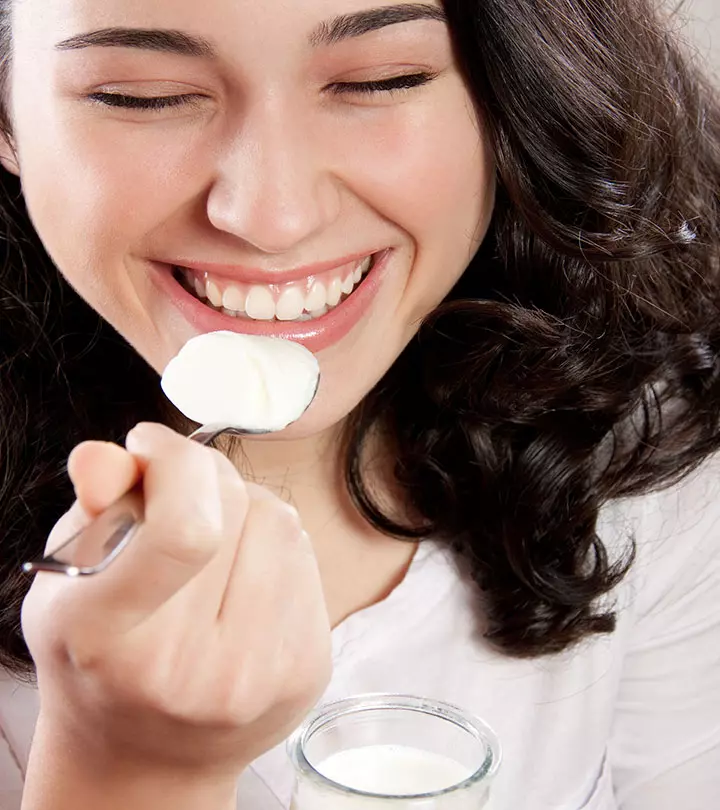
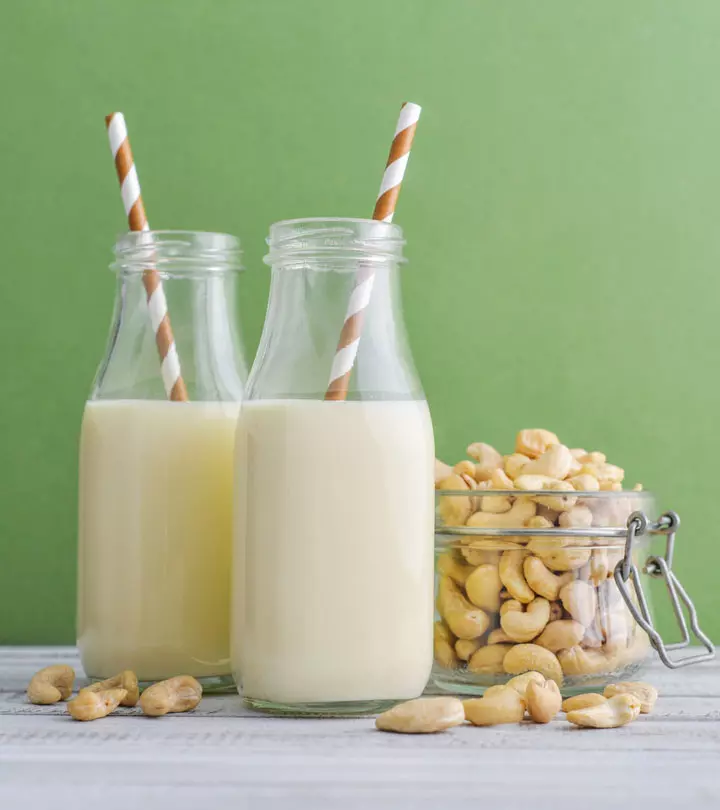
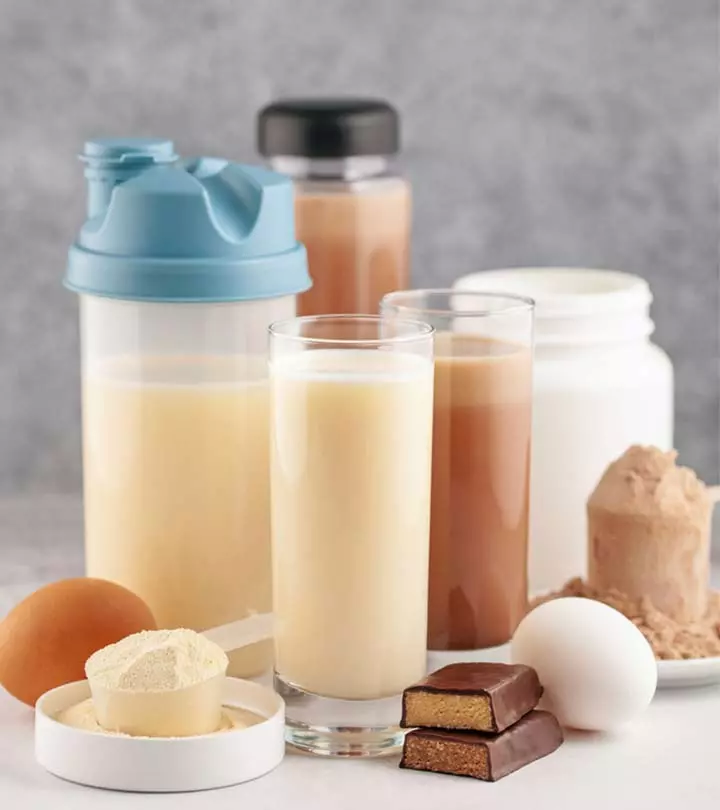
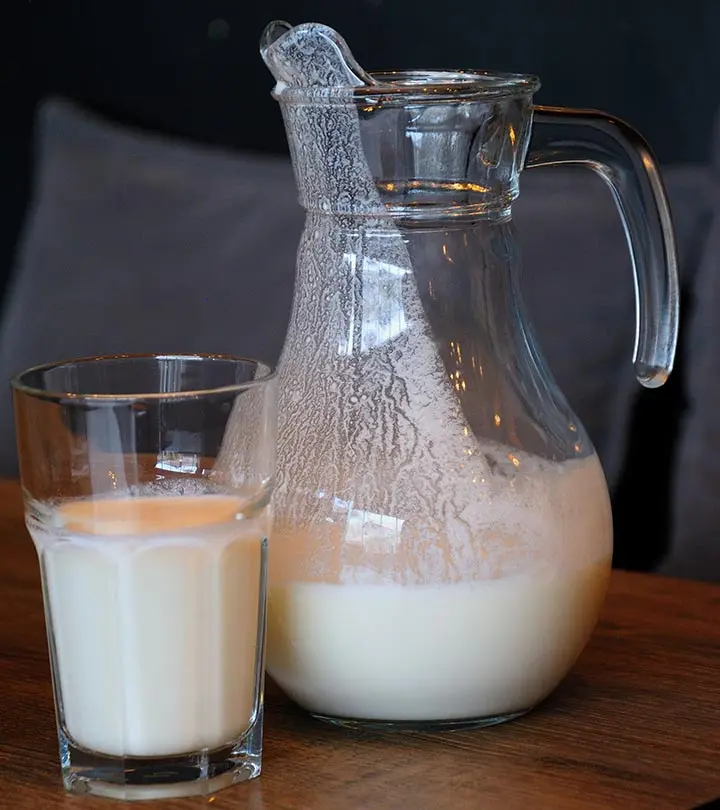
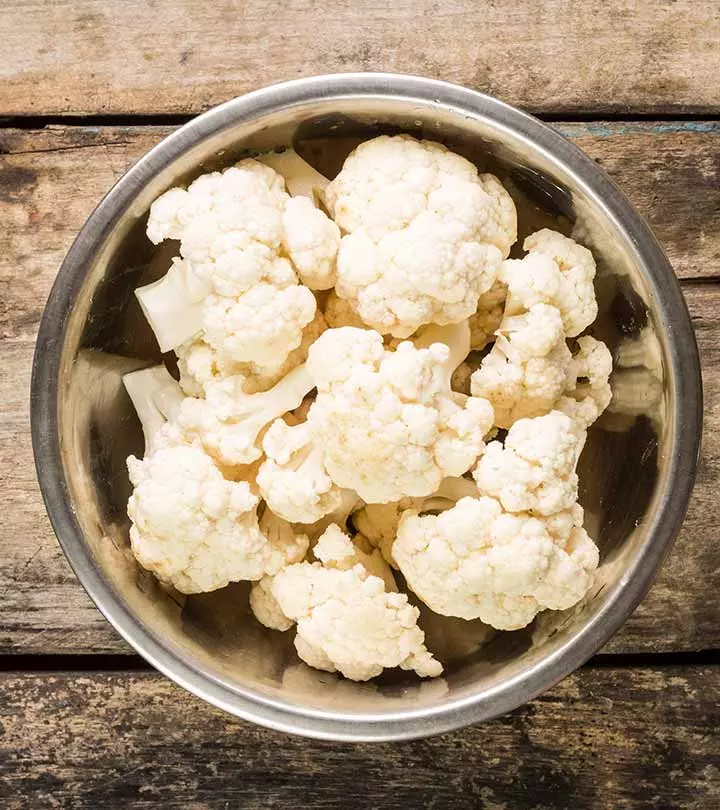





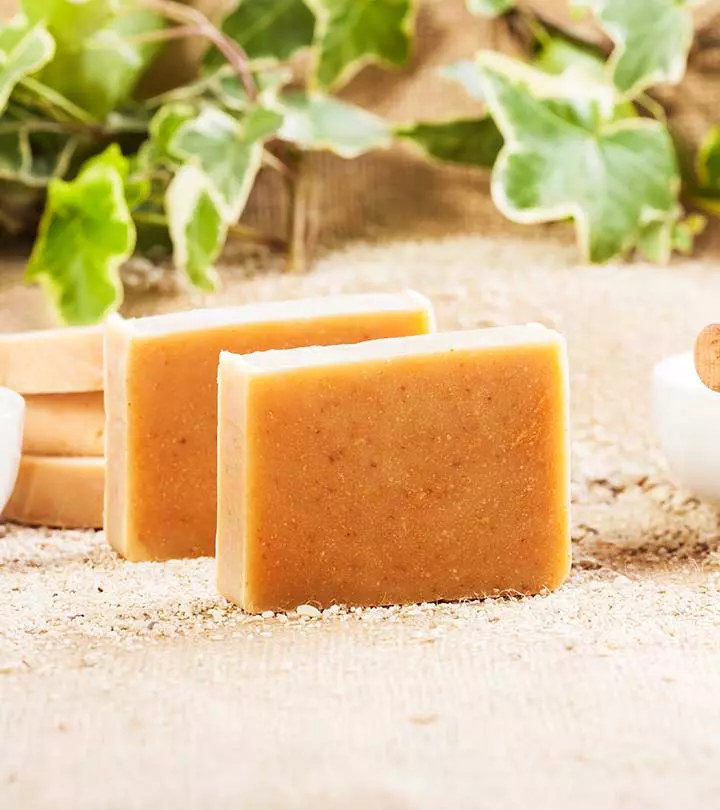
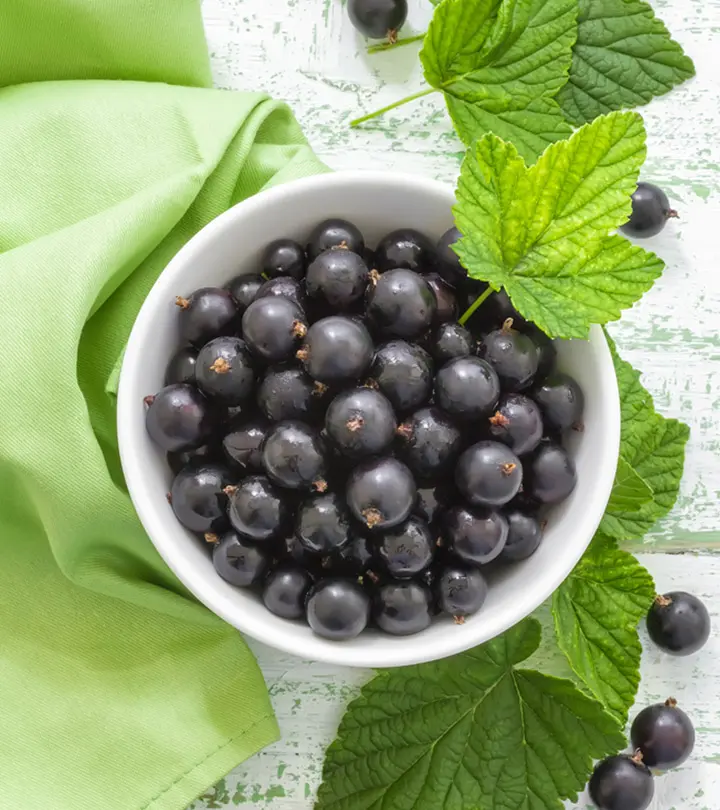
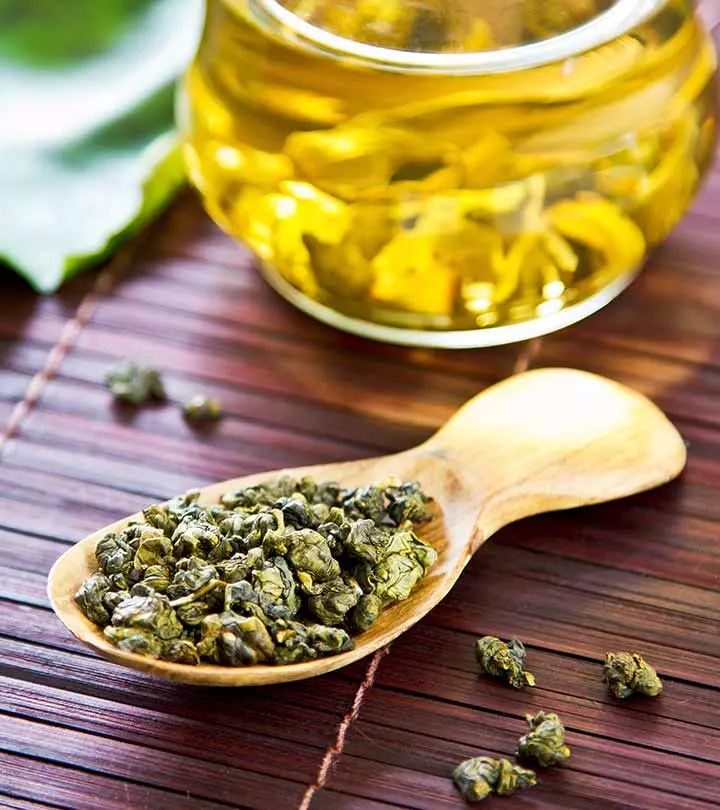
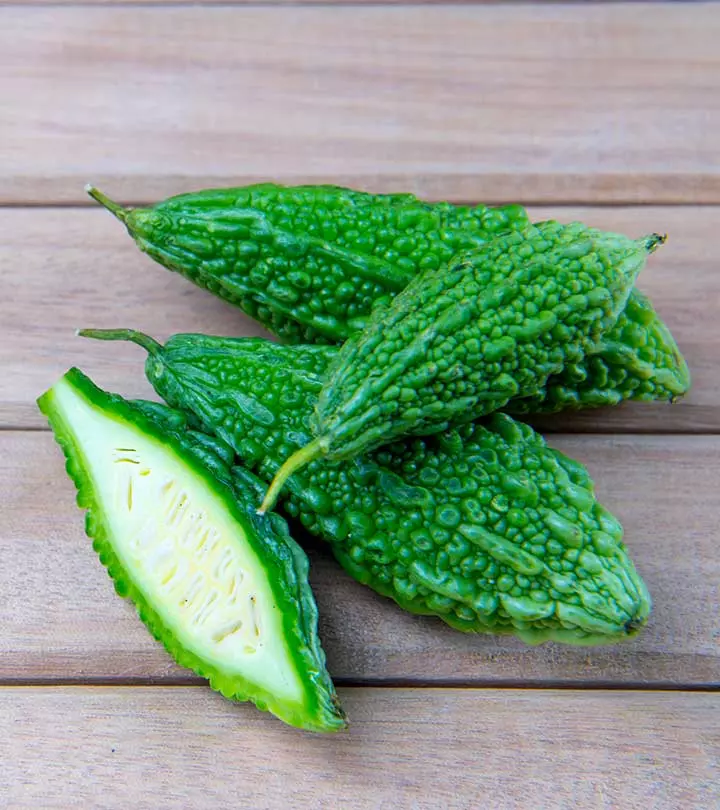
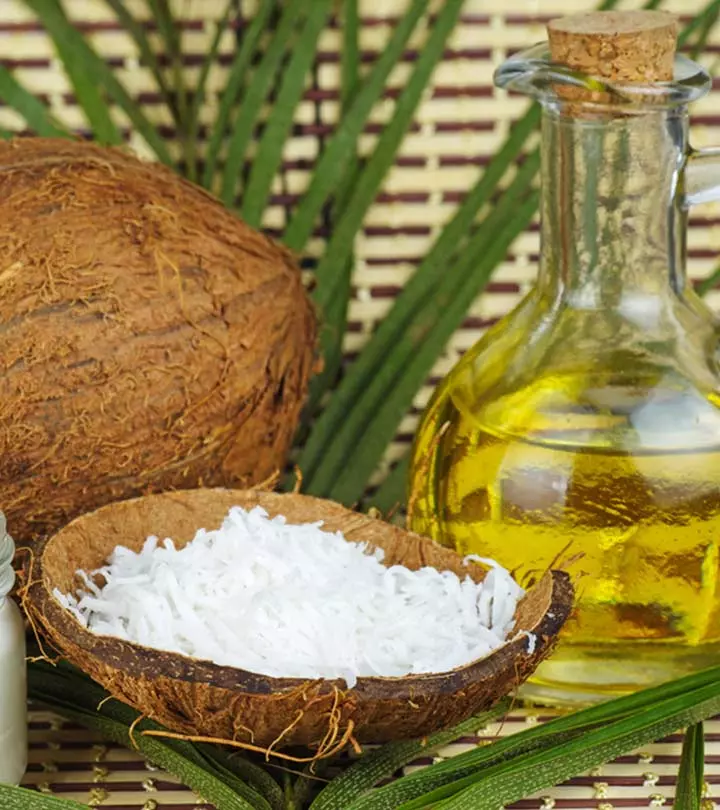


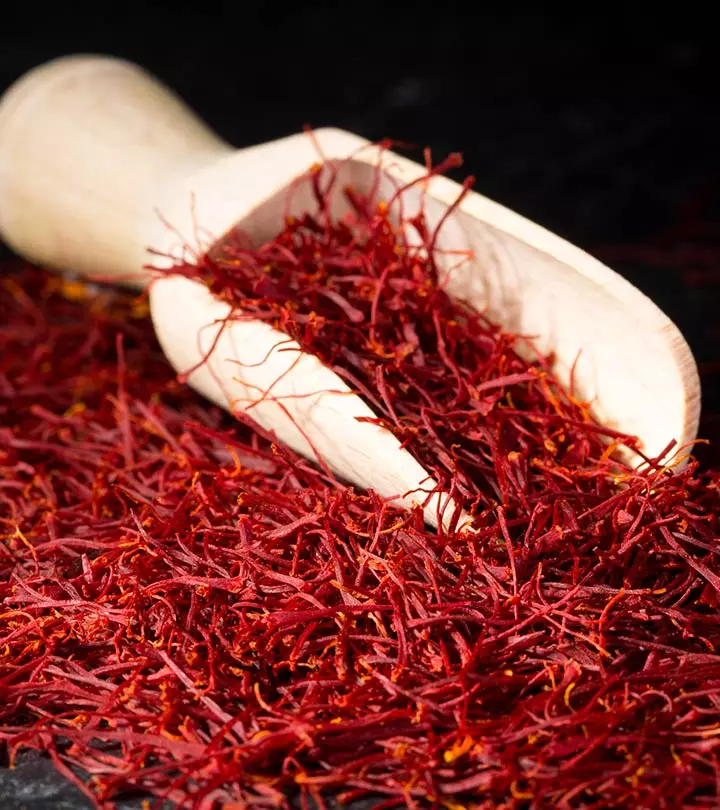
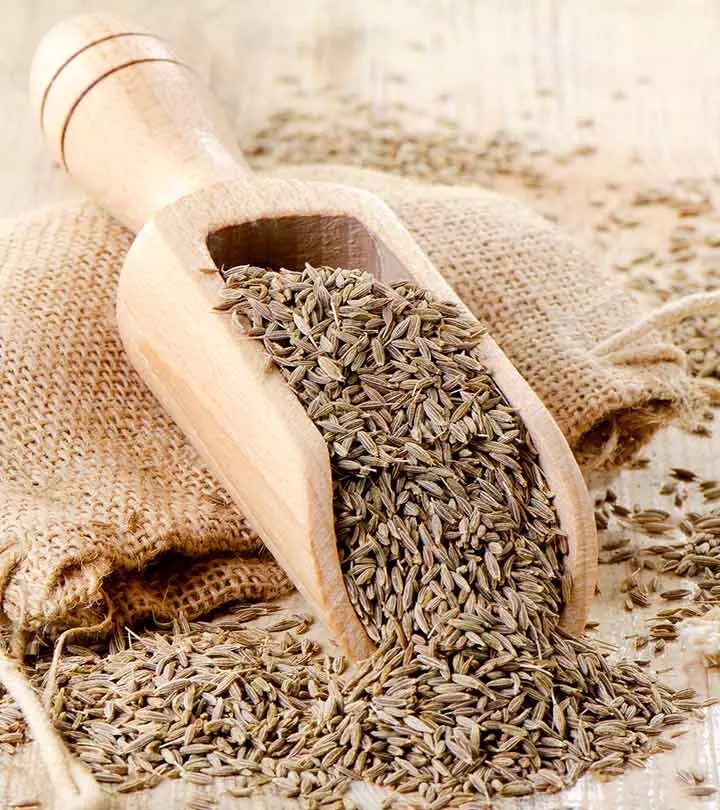

Community Experiences
Join the conversation and become a part of our empowering community! Share your stories, experiences, and insights to connect with other beauty, lifestyle, and health enthusiasts.